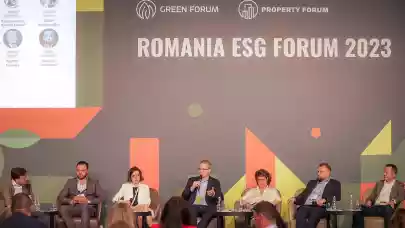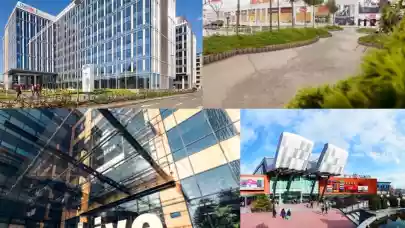
Progress on ESG in the real estate industry has been seen since 2018 and sustainability considerations are shaping investment strategies and client demand, concluded speakers of the ESG in real estate panel of Romania ESG Forum 2023, organised by Green Forum and Property Forum last week in Bucharest.
Steffen Walvius, Global Lead for Asset Performance & Modelling, Head of Sustainability Services CEE, JLL, who chaired the panel, has pointed out that investors are taking into underwriting the green certification process of buildings.
The Romanian market for real estate green certificates has developed from zero to almost 1,000 buildings in around a decade, according to Andrei Botis MRICS, President, Romania Green Building Council (RGBC). He added that RGBC and Skanska have completed this year a project to have the first zero-carbon building in Romania. The certification process was initiated in 2020.
Tjidsger Wierda, Partner, Corporate ESG Consulting, Walvius Group, explained that the basics for green certification are energy consumption and emissions per sqm. Speaking about the ESG scores, he added that they depend a lot on the country and legislation. For instance, social legislation in countries like Germany is stronger and more advanced compared to the EU legislation.
Progress on ESG in the real estate industry has been seen since 2018, before the approval of the EU Green Deal, explained Carolina De Ávila, ESG & Sustainability Consultant, SEVEN Sustainability. She added that the EU regulation on sustainability is shaping the investment environment, while companies that do not comply with ESG regulations will not survive in the long term.
Rafaela Nebreda, Founder, Grupo Demetra / Owner, Imoteca mentioned that after COVID-19, homebuyers have different needs and are looking for terraces and modular spaces in the houses, for instance for meeting spaces and different family arrangements. Speaking about sustainability policies, Nebreda pointed out that the biggest challenge is to encourage investors with brown portfolios to transform them into green. Moreover, she would ask decision-makers to adapt the legislation for Public Private Partnerships (PPP).
Daniel Schreiner, Principal ESG Asset Management, Deutsche Investment, explained that ESG is important for the three types of funds managed by the firm. He added that the digitalisation of the building is one of the key factors considered when looking to invest in a non-residential project.
ESG has an important role in decision making and the focus is to have efficient buildings, explained Antoniu Panait, Managing Director, Vastint Romania. From an ESG perspective, Vastint has buildings with efficient facades, as this was an internal requirement. Speaking about sustainability practices, Panait pointed out that Vastint started the process of recycling from the purchase of land plots until the operation of the building. This is complemented by efficient solutions for water and energy.



